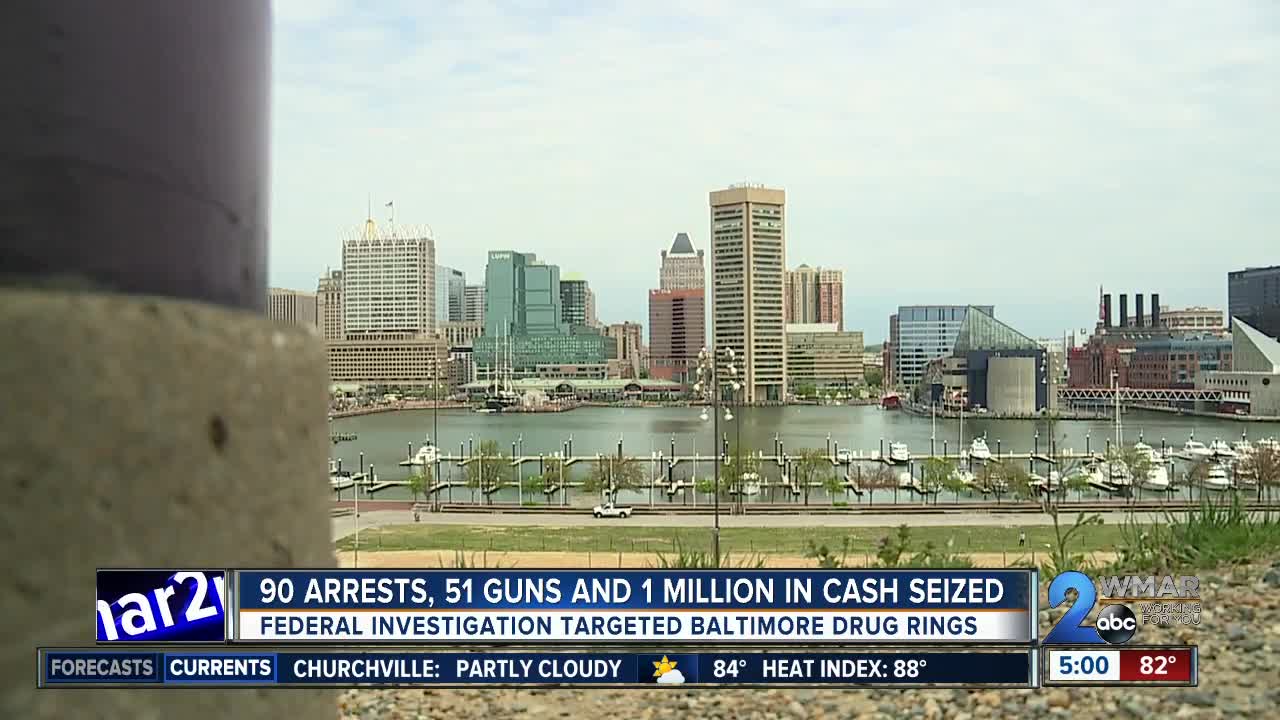BALTIMORE — A coordinated effort between federal and local law enforcement has resulted in the indictments of 90 defendants representing at least four drug trafficking organizations operating in different areas of Baltimore, United States Attorney Robert Hur announced at a press conference held at Union Baptist Church in Baltimore.
Investigators also seized nearly a million dollars in cash, 51 guns and enough fentanyl to kill more than 200,000. The fresh batch of indictments raises the total to 215 defendants charged in 2019 as part of the Project Safe Neighborhoods violent-crime reduction strategy. Hur’s office said they are on pace to charge 50 percent more defendants this year than they did in 2018.
"We're removing drugs from the streets. We're removing guns from the streets, and we're removing bad actors from the streets of Baltimore," said Baltimore Police Commissioner Michael Harrison.
The 90 have been indicted by federal grand juries in the last few weeks, but the investigation took months. Officers went undercover to buy drugs from the defendants, putting the pieces together to take down four separate drug rings across Baltimore. The violent-crime reduction strategy was coordinated between Baltimore Police, federal prosecutors, and other federal partners like the Bureau of Alcohol, Tobacco, Firearms and Explosives, and the Federal Bureau of Investigations, Baltimore office.
The first 25 defendants were arrested and charged in a 30-count grand jury indictment that targeted the Monument Street Drug Trafficking Organization known as “DTO.” The group operated in the area of the 400 block of N. Montford Avenue and Jefferson Street, and the 2400 block of E. Monument Street at Port Street. The defendants were accused of distributing drugs in the area beginning in July of 2018, selling heroin, fentanyl, cocaine, and crack cocaine to both individual users and bulk buyers. During the investigation, law enforcement seized nine guns, 140 kilograms of cocaine, 4.5 kilograms of heroin, 479 grams of fentanyl, which they say is enough to kill over 200,000 people, $472,00 in cash, and vehicles worth $466,000. In addition to drug and conspiracy charges, 10 defendants will face gun charges.
Six were also arrested for a drug conspiracy operating since January 2019 in the area of Frederick and Collins Streets in West Baltimore. In this investigation, five guns were seized – including a handgun modified to fire as a fully-automatic weapon.
A drug organization operating out of Southwest Baltimore’s Edmondson Village neighborhood was targeted in two indictments that charge 38 people for participating in a drug ring that distributed heroin, fentanyl, cocaine, and crack cocaine. Members of the organization used houses in and around Baltimore to process, cut, package, and prepare for sale their drugs, according to the investigation. The group also distributed drugs in Maryland, Virginia, West Virginia, and Pennsylvania. Authorities say they are responsible for at least five overdose deaths, including the father of one of the conspirators. The group is also accused of using violence to defend their territory and retaliate against those who tried to rob or cheat them. Members are tied to a shooting death on May 5, 2018 and a gunfight on Oct. 16, 2018 in which a bystander was struck. Investigators seized 17 guns, ammunition, drugs, and more than $270,000 in alleged drug proceeds from members of the drug crew.
In Northwest Baltimore, 21 men were indicted for operating a drug ring selling heroin, crack, cocaine, fentanyl, and cannabis in the area of Liberty Heights Avenue and Garrison Boulevard. Investigators seized 20 guns, more than $20,000 in cash, 50 grams of crack, and more than a kilogram of fentanyl from members of the organization. The organization is said to be a combination of two allied gangs, the Black Guerrilla Family and the Yellow Bus Gang Crips, going by the LNG gang. Members of the gang are alleged to have participated in an 11 a.m. gunfight on Jan. 19, 2019.
Hur said his focus is on curbing violence, going after gun offenders particularly. Hur stressed the gravity of facing federal gun charges, which don’t offer parole or lightened sentences for those who are convicted.
“The message is clear,” Hur said, “gun crime leads to federal time.”
Stressed by both Hur and Commissioner Harrison is the reliance on community collaboration in their efforts.
Harrison said he hears from people in communities who notice when “bad actors” have been taken off the streets and the difference that makes to the community. Part of the community interaction prerogative also involves the U.S. Attorney’s Office going into the community more proactively. Members of Hur’s office will do “call-in” visits to people identified by parole or probation officials as likely to re-offend. During these meetings, federal attorneys will stress the consequences of subsequent federal prosecutions.
Service providers will also connect people with resources to find housing, job training, identification services, and other needs. One such public service fair was being held at the church where Thursday’s press conference was being held. More information about such events and campaigns can be found online.
“We’ve got a lot of problems to solve," said Hur, "and the only way we’re going to solve them is together.”


